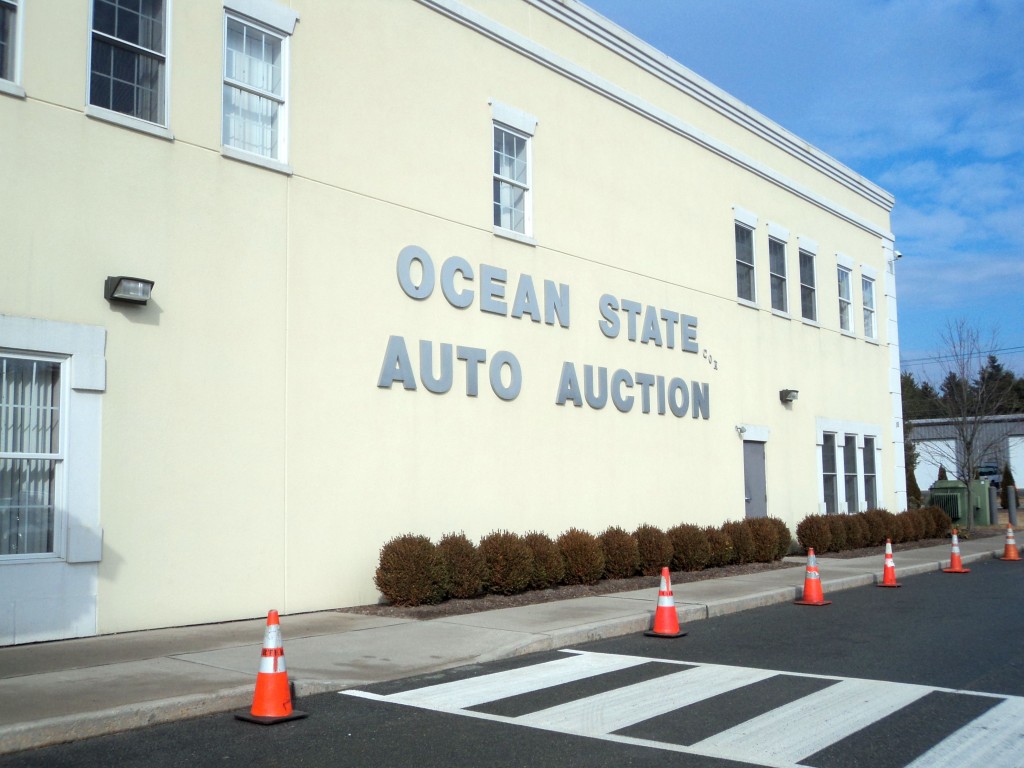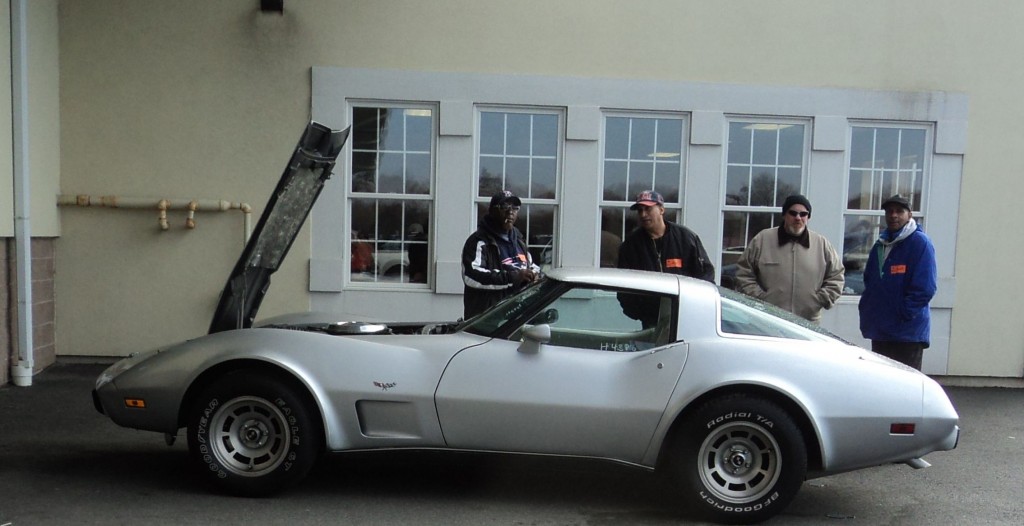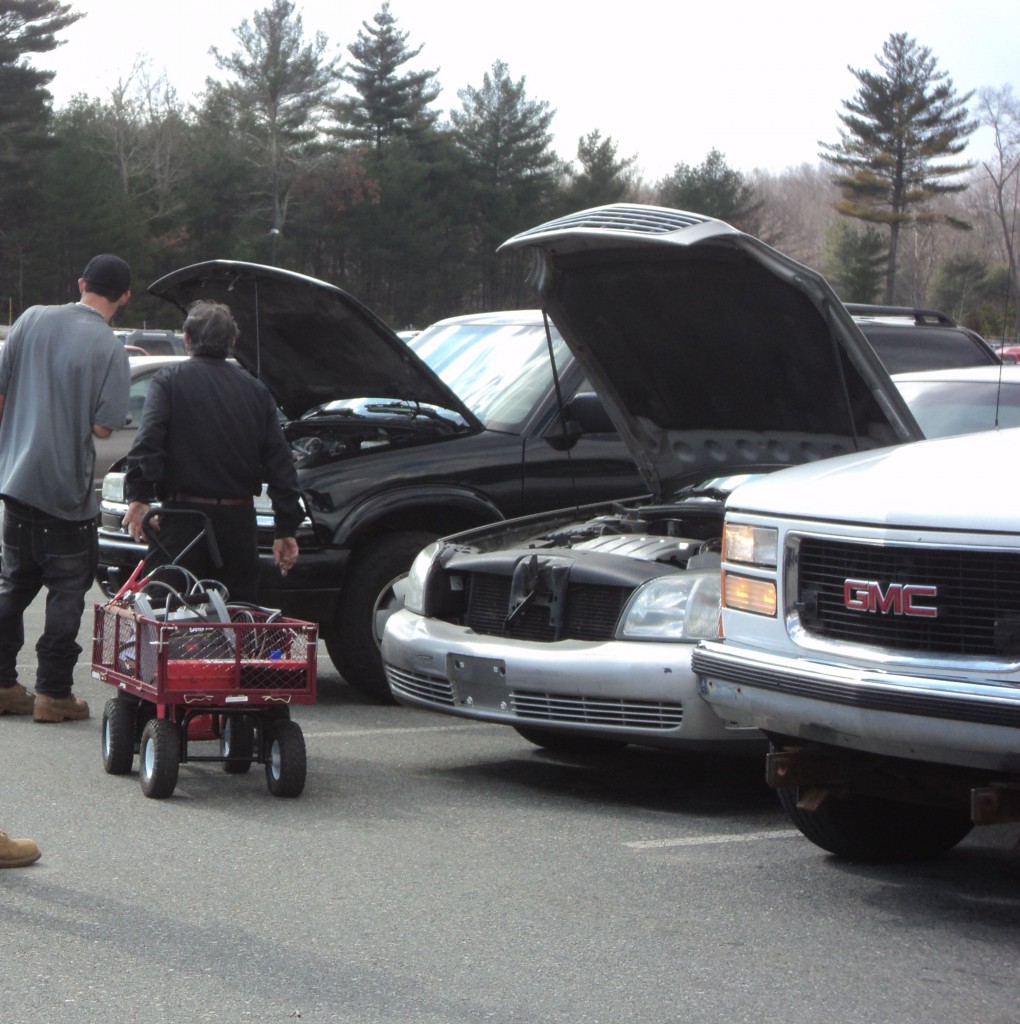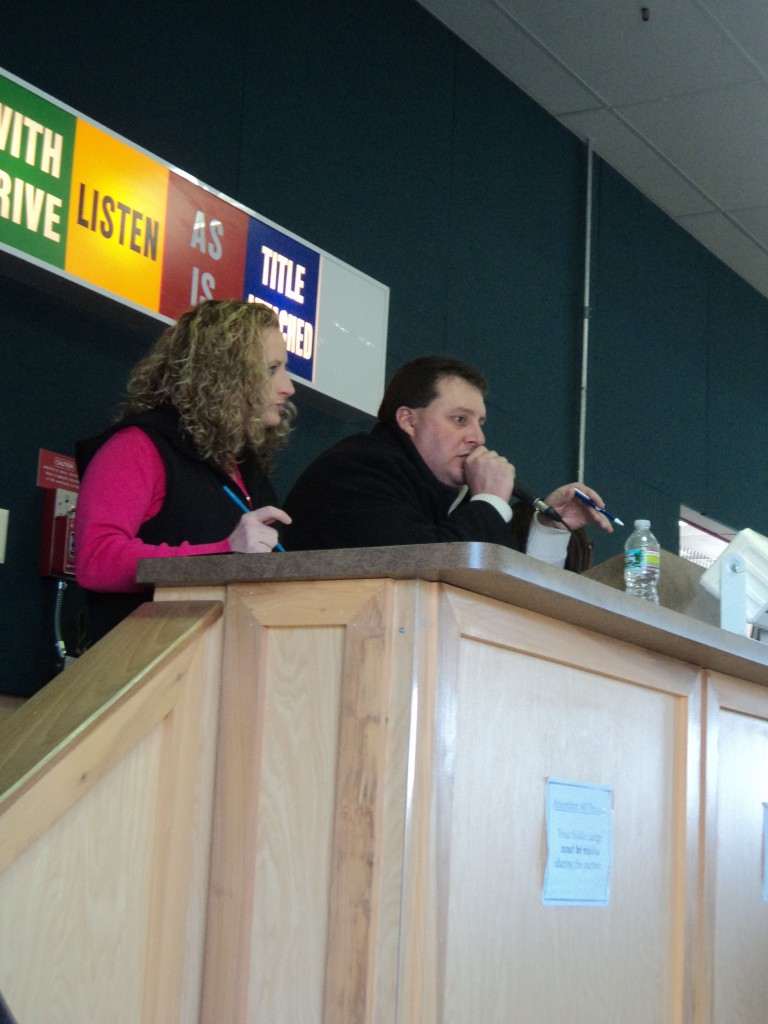One of the ways that Car Donation Wizard processes donated vehicles is by selling them to licensed dealers at wholesale auctions across the country. The proceeds from each vehicle sale are forwarded to the donor’s charity of choice. The donor then gets the ability to deduct the sale price of the vehicle from their taxes.
To get a better idea of this process, we attended one of these auctions in person to show you in detail just how it all works. The auction we chose to attend was Ocean State Auto Auction right nearby in our home state of Rhode Island. Ocean State Auto Auction is the only wholesale auto auction in the small state of Rhode Island. They facilitate the sale of thousands of vehicles each year.
About Ocean State Auto Auction
These vehicles are not just donated cars. Actually, the majority of vehicles processed through Ocean State are former lease cars, former utility cars, bank repossessions, recreational vehicles, dealer sales, and insurance loss cars. The insurance loss vehicles, for example, consist of cars that were involved in some sort of accident, and that the owners chose to relinquish rather than repair. The insurance company then sells the vehicle to licensed dealers, who in turn either fix them for resale or part them out.
Ocean State does not ever technically own these vehicles. They are merely facilitating the sale of them. But they do so by attracting a wide range of buyers that come to buy the vehicles in their huge auction garage. Ocean State makes a profit by charging fees for buying and selling the vehicles. All of the vehicles are stored outdoors in a massive lot. They are all inventoried and numbered. Chalk marks on the windshield denote the stock number and mileage.
What Happens During an Auction?
The auction itself takes place in a massive indoor garage with multiple “lanes” lettered in alphabetical order. There are garage doors at each end of the vehicle lanes for the vehicles to drive through. Inside, each lane is devoted to several categories of vehicles. One or more Ocean State employees are assigned to oversee each lane.
Before the sale, attendants prep the vehicles and line them up to the garage door in their respective lanes. Typically a preparation will consist of washing and detailing the vehicle, charging the battery or other quick minor adjustments to get the vehicles ready to go.
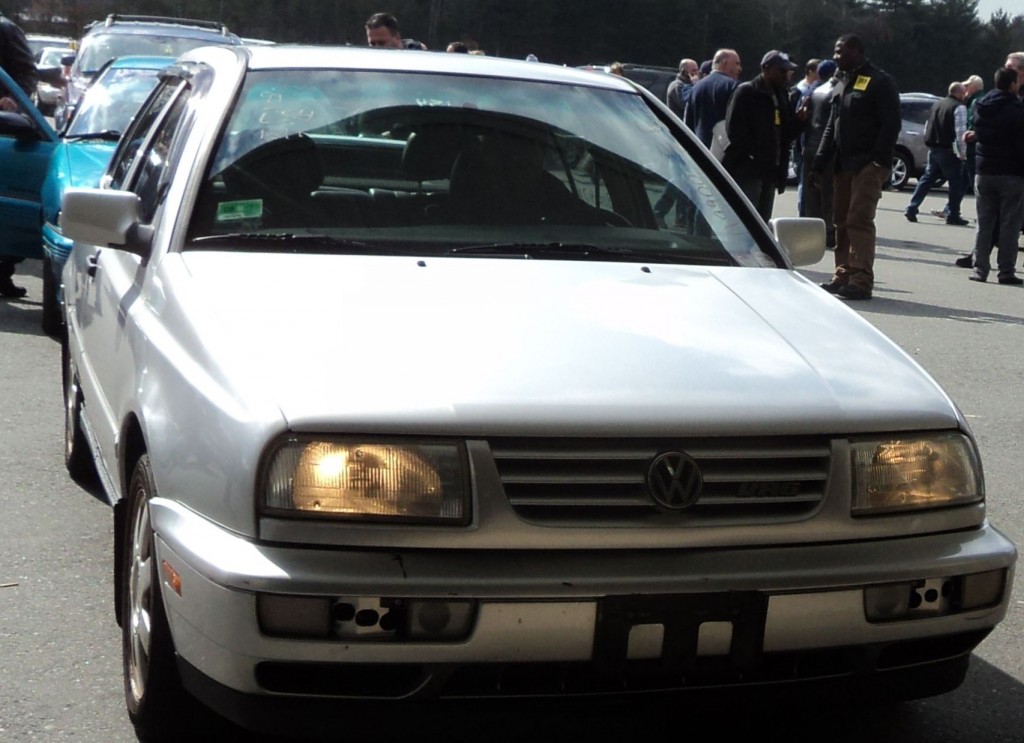
A 1999 Volkswagen Jetta GLX VR6 is headed into the garage lane to be auctioned. The vehicle was donated through the Car Talk Vehicle Donation Program.
When the auction starts, the vehicles up for sale are driven into the garage. Cars that aren’t running are pushed in from behind by padded trucks. The vehicles then pause for brief buyer inspection. Prospective buyers have a chance to look the car over, examine any body flaws, and open the doors and look inside the interior. Diagnostic tools are not allowed. But there is really no point to that at a dealer-only auction. These vehicles are sold as-is, so it is implied they may have problems and the dealers are fully aware and prepared. The big picture is what influences buyers’ decisions: year, make, model mileage and condition. Most important is whether the vehicle runs and drive or not. The auction does certify and stand behind certain vehicles that are running with no major issues, so if the buyer does buy a vehicle that seems misrepresented, they can return it. But most of the time, that’s not an issue. These buyers know exactly what they want.
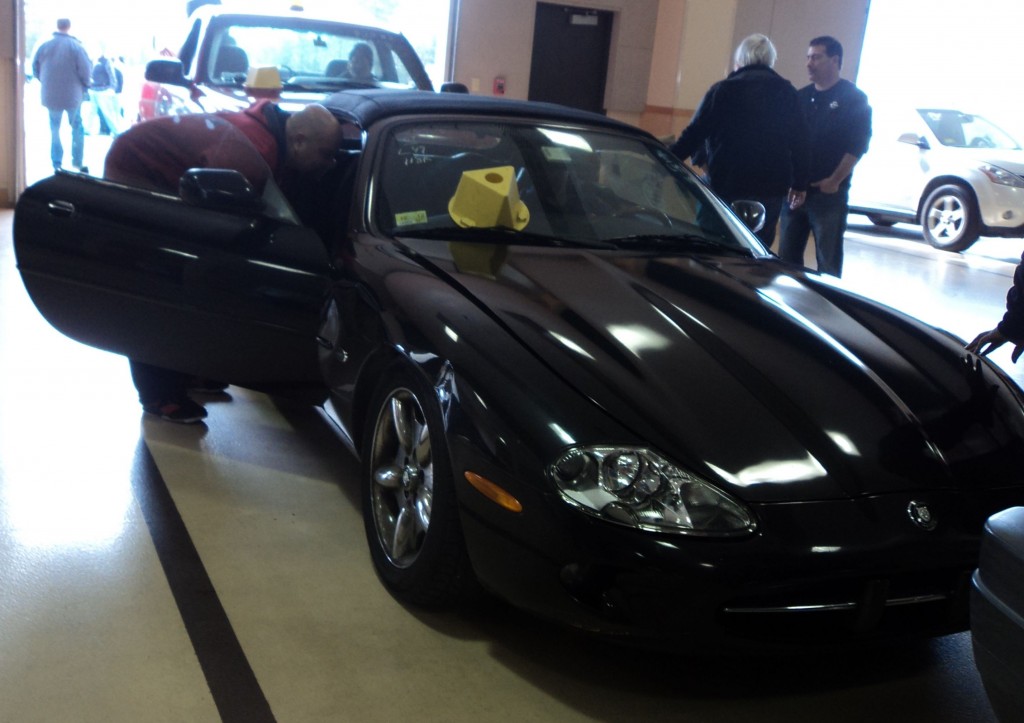
A potential buyer inspects the interior of a 1997 Jaguar XK8 convertible generously donated through the Car Talk Vehicle Donation Program.
Bidding starts right away and only lasts a couple of minutes. Each lane has a tall bidding podium where the announcer is seated to accept bids. Buyers will subtly indicate they want to place a bid, usually with a non-verbal form of body communication: a raised hand, an arm motion, a nod of their head. The highest bidder wins. Not all cars are sold automatically, however. If there is an especially valuable or high-interest vehicle, off-site sellers will most likely review the high bid later and decide to accept or not. If the bid is approved on site, and if winners can provide payment on site and have temporary license plates to put on the vehicle, they can drive the cars home the same day.
Once the bidding is completed, the vehicle is then driven out the other end of the garage and back into the lot. Workers on deck mop the lane after the vehicles drive through to keep the area clean and tidy. The next car is then driven through, and the whole process starts over again, until the auction ends for that day. Typical auctions last a few hours.
So there you have it: an exclusive look into the hectic, fast-paced world of wholesale auto auctions, where your generous vehicle donation is processed. Your donated car is just one of many vehicles, but it’s still given special treatment and a chance to raise as much money as possible for a great cause.
How to Donate a Car
Donating your car is an easy way to support a charity close to your heart. However, there are thousands of fraudulent programs looking to capitalize on your generosity. Before you go ahead and submit a car donation, be sure to check out these tips on avoiding car donation scams. Car Donation Wizard provides full transparency along each step of the car donation process, which lets you avoid car donations scams. We accept all car donations, trucks, motorcycles, boats, snowmobiles, trailers, and RV’s. We love to feature donor stories and selfies on our Facebook and Instagram pages. To date, Car Donation Wizard has proudly raised over $250 million for our charity partners. Car Donation Wizard returns 80% of the gross proceeds from each vehicle donated back to the charity – the highest of any vehicle donation program!
You can donate your car to charity by following these easy steps:
- Select the charity you want to support.
- Provide information about your vehicle and yourself.
- After you submit the donation form, a partnered towing agent will reach out to you within 2-3 business days to arrange a vehicle pick up time most convenient for you. If you have questions on what to expect on the day your car is picked up, watch our YouTube video that explains the pick up process.
- Once your vehicle is sold, you’ll be provided with a tax receipt.
We make the car donation process quick and easy. Visit us online or call us at 877-957-2277 to learn more about the charities we work with.
